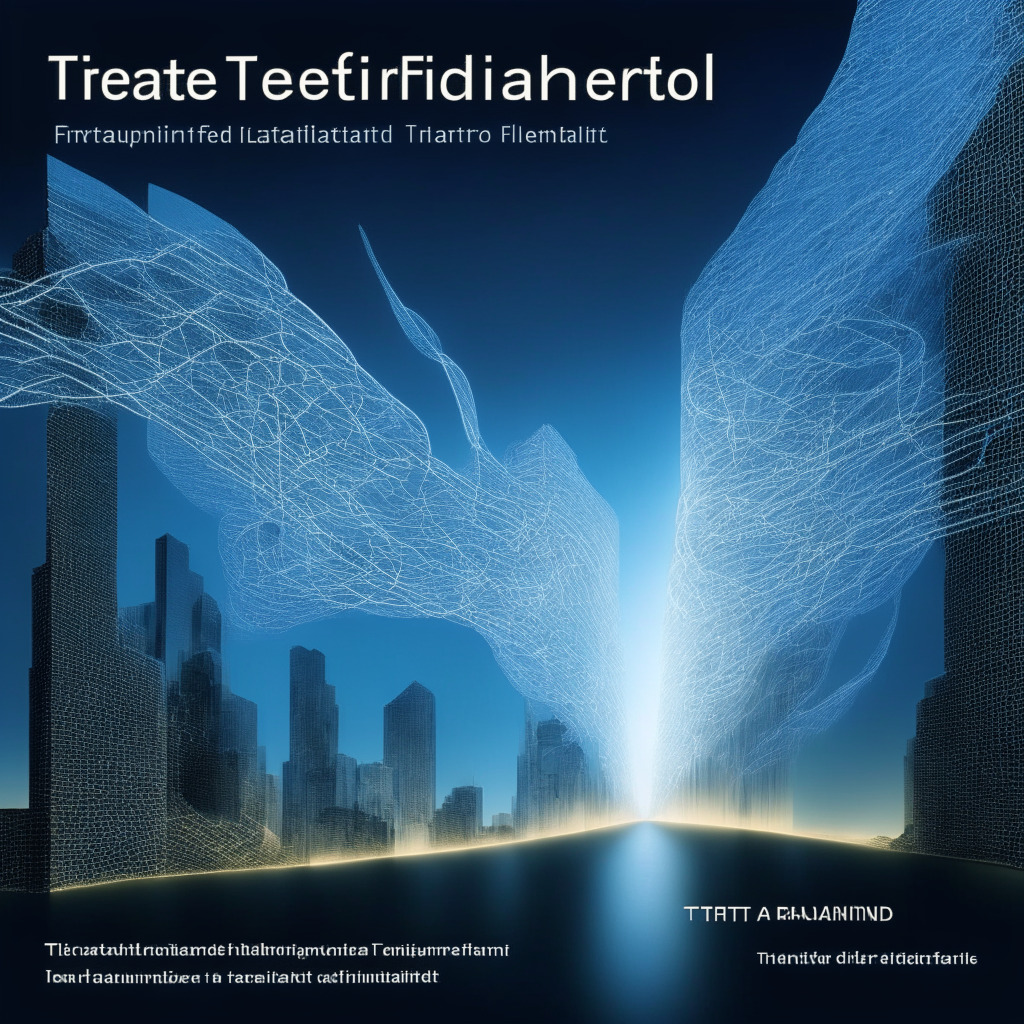“Tencent, the operator of WeChat and WeChat Pay, is teaming up with the People’s Bank of China to promote the use of the digital yuan via Project mBridge. While this challenges the dominance of WeChat Pay and Alipay, the digital yuan is anticipated to complement rather than compete with these platforms. This venture signifies a technological revolution in payment systems, though its uncertainties remain to be explored.”
Search Results for: digital ruble
The Impending Role of Blockchain: Will Digital Currencies Supersede Banks?
Russian legislator, Anatoly Aksakov, suggests the role of banks might diminish with advancements in blockchain technology, especially with the advent of the digital ruble. This technology presents a potential competitor to digital assets, raising concerns about financial stability. Aksakov believes this could render traditional banking obsolete, replacing human decision-making with automated actions.
Testing the Digital Waters: Russia’s Central Bank Propels CBDC Projects Amid Skepticism
“The Russian banks MTS and PSB are testing the digital ruble, aiming for a national rollout between 2025-2027. With real-world applications like PSB’s digital wallet and promising transaction fees, skepticism still surrounds the quick adoption of this Central Bank Digital Currency (CBDC).”
BRICS Digital Currency Debate: The Future of Global Trade or Merely a Fantasy?
Experts from Brazil anticipate BRICS summit discussions on a potential digital fiat currency, with workgroups likely being established for the initiative. A collective digital currency could potentially replace the US dollar in trade deals among BRICS nations despite sceptical voices. Individual nations within the BRICS alliance, including China, Russia, and Brazil, have already initiated their own Central Bank Digital Currency (CBDC) projects.
CBDCs: Kazakhstan’s Digital Currency Ambitions and the Power Shortages Plaguing Crypto Miners
Former Soviet nations like Kazakhstan are making strides towards embracing Central Bank Digital Currency (CBDC). Echoing Russia and Belarus’ approach, Kazakhstan proposes its CBDC as an ‘add-on’ to existing cash and non-cash payment forms. Despite certain challenges with digital currencies, the nation anticipates full implementation of its CBDC by 2025.
Decoding Global Markets: Fluctuating Ruble, Peso and Unexpected Stagnancy of Bitcoin and Gold
The Russian ruble and Argentina’s peso’s recent turbulence exposes potential global market weaknesses. However, Bitcoin and gold have not seen the anticipated safe-haven investment surge. Possible reasons include the rise in U.S. government bond yields, which may reveal more systemic vulnerabilities.
Belarus Takes Steps Toward Central Bank Digital Currency Amid Global Race
Belarus is following a digital revolution trend towards Central Bank Digital Currency (CBDC) initiatives, with preparations to launch a digital variant of the Belarusian ruble. This landmark project by the National Bank of the Republic of Belarus (NBRB) indicates potential for cross-border payments and compatibility with other global CBDCs.
Russo-Chinese Digital Currency Alliance: Pros, Cons, and The Inherent Power Tussle
Anatoly Aksakov, a Russian political figure, suggested potential compatibility between Russia and China’s Central Bank Digital Currencies (CBDCs) for international payments. With aims to use the digital ruble for global economic activities, this proposal hints at the possibility of digital currencies taking the centre stage in world trade.
China’s Digital Yuan Tests: Ushering in a Cashless Future or the Death of Traditional Banking?
“The Bank of China tests an offline payment system linked to SIM cards for the digital yuan, marking China’s push towards a cashless society with their central bank digital currency (CBDC). This signals the potential future of centralized digital currencies.”
Russian Firms Turn to Crypto for Overseas Trade: Legal Repercussions and Future Regulations
Russian firms are using cryptocurrency for overseas transactions to circumvent US and EU sanctions, while operating within the existing legal framework. However, the Russian Central Bank expresses openness to digital currency-based trade, prioritizing the launch of a digital ruble and developing cryptocurrency regulations. The government’s balancing act between digital currencies and their digital ruble initiative remains to be seen.
Exploring Russia’s Pivot to Crypto: Boosting Trade Ties or Cannibalizing Traditional Banking?
Russian entrepreneurs aim to use “digital assets” and a “unified digital currency” for trade with BRICS and other nations. The idea of utilizing digital financial assets (DFAs), which may encompass digitized commodities, CBDCs, digital securities, cryptoassets, and stablecoins, in international payments is garnering attention. The possibility of creating a unified digital currency for cross-border transactions is also being evaluated.
Ethereum’s Staking Limit, Argentina’s Bitcoin Surge, and Blockchain Security: Weekly Crypto Roundup
“In an evolving crypto landscape, Ethereum staking providers limited their ownership to 22%, towards decentralization. Bitcoin adoption rises in Argentina contrasting El Salvador’s caution. Binance addresses regulatory environment while security concerns persist despite OpenZeppelin’s Defender 2.0 upgrade. NFTs, CBDCs progress, and stricter crypto regulations emerge.”
Binance’s Existential Crisis: Will the Crypto Giant Exit Russia Amidst Growing Legal Woes?
“Binance, the leading crypto exchange, is considering an absolute exit from Russia amid increasing Western sanctions. This comes after allegations of enabling transactions related to sanctioned Russian banks, escalating global legal issues, and potential indictments for possible infringement of anti-money laundering laws.”
A Rollercoaster Crypto Week: Triumphs, Tribulations, and the Quest for Unchartered Territories
“In a dynamic crypto week marked by revenue surges, privacy breaches, and promising tech advancements, we also see virtual activism in Metaverse, innovative crypto-related services, and increasing institutional embrace of digital assets. However, challenges persist with regulatory complexities and cyber threats.”
Navigating Blockchain: Innovations, Challenges, and the Intriguing Future of Cryptocurrency
“A telling report by Glassnode indicates that long-term crypto holders are showing tenacity, with Coinbase and Binance creating waves in the sector. Coinbase launched its Ethereum layer-2 blockchain, whereas Binance became the first fully licensed crypto exchange in El Salvador.”
SEC vs Ripple: Regulatory Storms and the Unwavering Crypto Market
“The ever-fluctuating crypto market demonstrates resilience, navigating through regulatory challenges and cybersecurity vulnerabilities. Recently, the SEC expressed intent to appeal the partial victory of Ripple’s XRP token. Despite such developments and inherent risks in the DeFi landscape, the ‘HODLing’ behaviour and initiatives from organizations like PayPal, Microsoft, and Aptos Labs reaffirm crypto’s stronghold in mainstream finance.”
Brazil’s CBDC ‘Drex’: Triumph in Banking or Gateway to Central Authority Meddling?
“Brazil’s Central Bank recently introduced its central bank digital currency, Drex. However, concerns are raised by the currency’s potential for central authority interference, alongside questions about the movement of assets of popular cryptos following the collapse of Silvergate Bank. Advocates, meanwhile, hail the currency’s potential to improve Brazil’s banking sector.”
Global Ripple Effect of Crypto Regulations: Innovation versus Protection
The article focuses on recent developments related to crypto legislation, controversy surrounding Worldcoin’s data collection practices, Russia’s progress with a central bank digital currency, and Binance retracting its crypto custody license application in Germany. The central issue revolves around the challenge of balancing innovation and public protection in international blockchain regulation.
Legal Complexities and Regulatory Scopes in the Evolving Cryptoasset Space: The StakeHound Example
The blockchain and cryptoasset sector, marked by advancements, legal issues, and regulatory responses, involves complexities like the recent lawsuit between StakeHound and Celsius. Global legislators are working to ensure safe and transparent crypto markets, while controversies rise with the introduction of Central Bank Digital Currencies (CBDCs).
Exploring Offline CBDC Payments: Balancing Privacy, Fraud, and Accessibility
The Bank for International Settlements (BIS) explores offline central bank digital currency (CBDC) payments and their potential risks, including counterfeit threats and privacy issues, in a collaborative project with Consult Hyperion. The BIS emphasizes the importance of interoperability, risk management systems, and collaboration between public and private sectors for secure and reliable digital currency environments.
Binance and the Minefield of Sanctions: Navigating the Russian Crypto Landscape
“Binance is under scrutiny for potential ties with five sanctioned Russian banks, raising questions about compliance and potential sanctions violations. Critics claim Binance facilitated ruble trades and peer-to-peer transactions with these banks. However, Binance denies these allegations, stressing adherence to international sanctions rules.”
Binance’s Russian Rumble: Gearing Crypto Towards Regulatory Compliance or Decoupling From Traditional Bank Partners?
“Binance terminated its relations with five Russian banks amidst a system upgrade aimed at strengthening compliance with regulatory norms. This move brings into question the reliability of digital currencies as a stable transfer medium, highlighting the often complicated relationship between cryptocurrencies, regulatory compliance and traditional banking systems.”
Crypto Symphony: Week’s Highs and Lows from The World of Cryptocurrency
“This week, Bitcoin surged significantly and MicroStrategy plans to further boost its BTC coffers. Meanwhile, Tether marked a successful quarter, generating profits over $1 billion. Surprisingly, ETH 2,879 was rescued from a formidable hack thanks to an ethical hacker and Justin Sun. Volatility continues in the cryptocurrency market.”
Tether’s Surge amid Wagner Uprising: Cryptocurrencies as Safe Havens or Volatility Traps?
“In June, Wagner Group’s actions triggered a 277% surge in Tether trades amidst political turbulence in Russia, symbolizing crypto’s role as a safe haven. Yet, the volatility presents a paradox concerning cryptocurrencies’ reliability as a secure alternative during unrest.”
Crypto Taxation in Russia: A Paradox Amidst Legal Ambiguity and Regulatory Deadlocks
Russia’s Federal Tax Service (FTS) recently affirmed that citizens can pay taxes on crypto earnings in spite of the ambiguous legal status of cryptocurrency. Two tax methodologies are proposed: personal income tax disclosures or the condensed taxation system. This starkly contrasts with the Central Bank’s anti-crypto position, hinting at a deeper inconsistency in governmental approaches to digital financial technology in Russia.
Decoding Russia’s Supreme Court Verdict: Converting Crypto to Fiat Can Constitute Money Laundering
In a landmark ruling, Russia’s Supreme Court has classified the conversion of Bitcoin to fiat as possible money laundering in cases involving illegal activities. This decision has significant implications for future crypto-related legal scenarios, potentially leading to harsher sentences for unlawful activities involving cryptocurrencies. It also lays the groundwork for future regulations around cryptocurrencies’ involvement in cybercrime.
Concordia’s $4M Seed Funding: Uniting DeFi and TradFi or Facing Unforeseen Challenges?
Concordia, a multi-chain risk and collateral management protocol, secured $4 million in seed funding to simplify cross-chain liquidity and collateral access for users. Its anticipated mainnet launch aims to revolutionize digital assets management by unifying decentralized and traditional finance within one global financial fabric.


























